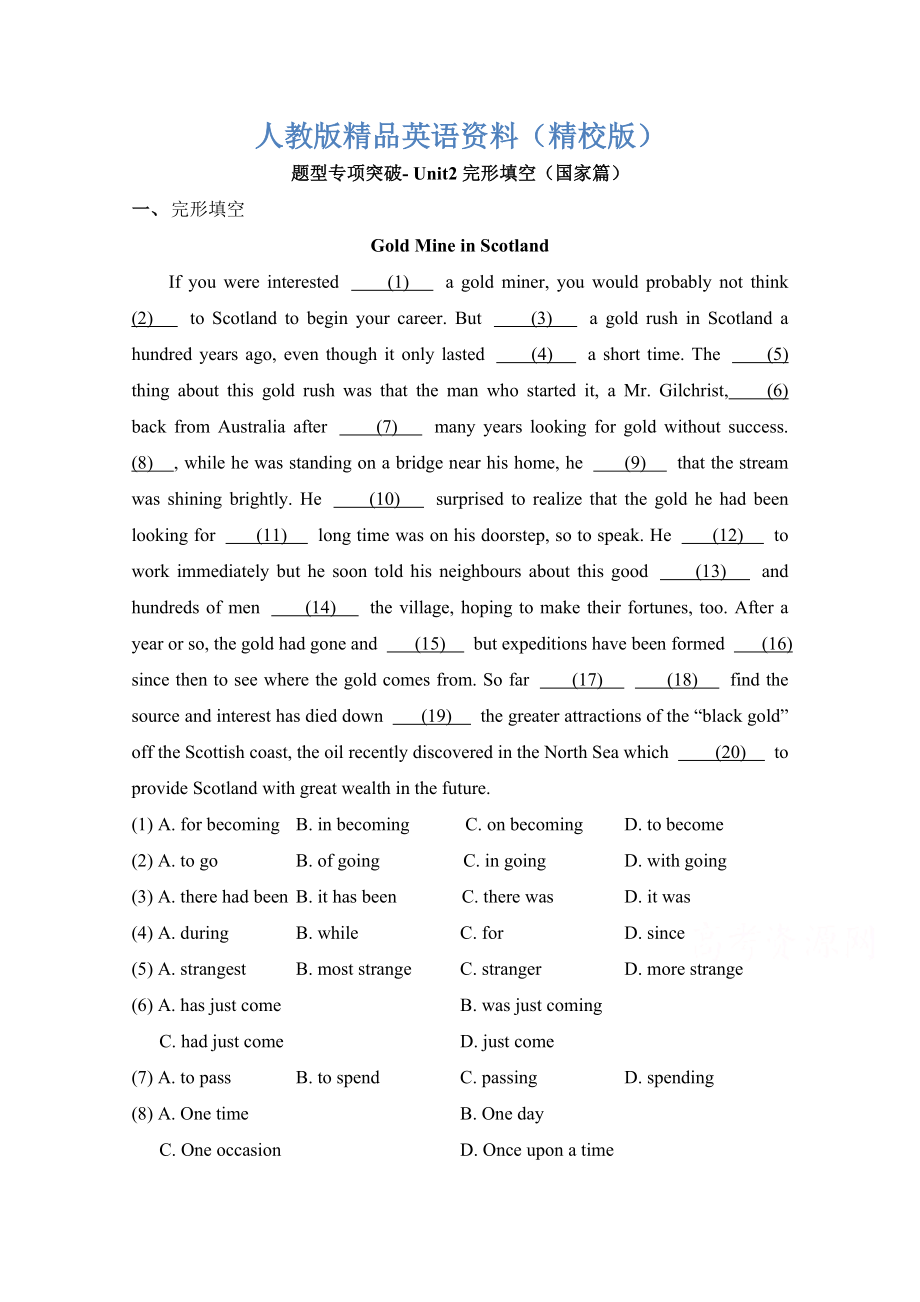《【精校版】人教版高中英語必修五 Unit2完形填空國家篇 題型專項(xiàng)突破 Word版含答案》由會(huì)員分享���,可在線閱讀����,更多相關(guān)《【精校版】人教版高中英語必修五 Unit2完形填空國家篇 題型專項(xiàng)突破 Word版含答案(3頁珍藏版)》請?jiān)谘b配圖網(wǎng)上搜索���。
1�����、人教版精品英語資料(精校版)
題型專項(xiàng)突破- Unit2完形填空(國家篇)
一�����、 完形填空
Gold Mine in Scotland
If you were interested (1) a gold miner, you would probably not think (2) to Scotland to begin your career. But (3) a gold rush in Scotland a hundred years ago, even though it only lasted (4) a short time
2�����、. The (5) thing about this gold rush was that the man who started it, a Mr. Gilchrist, (6) back from Australia after (7) many years looking for gold without success. (8) , while he was standing on a bridge near his home, he (9) that the stream was shining brightly. He (10)
3�����、 surprised to realize that the gold he had been looking for (11) long time was on his doorstep, so to speak. He (12) to work immediately but he soon told his neighbours about this good (13) and hundreds of men (14) the village, hoping to make their fortunes, too. After a year or
4�����、 so, the gold had gone and (15) but expeditions have been formed (16) since then to see where the gold comes from. So far (17) (18) find the source and interest has died down (19) the greater attractions of the “black gold” off the Scottish coast, the oil recently discovere
5���、d in the North Sea which (20) to provide Scotland with great wealth in the future.
(1) A. for becoming B. in becoming C. on becoming D. to become
(2) A. to go B. of going C. in going D. with going
(3) A. there had been B. it has been C. there was D. it was
(4) A. during
6、B. while C. for D. since
(5) A. strangest B. most strange C. stranger D. more strange
(6) A. has just come B. was just coming
C. had just come D. just come
(7) A. to pass B. to spend C. passing D. spending
(8) A. One time B. One day
C. One occasion D. Once upon a time
(9) A. noticed B.
7����、remarked C. viewed D. accounted
(10) A. had to be B. was to be C. should have been D. must have been
(10) A. so B. such C. such a D. a so
(12) A. came B. made C. put D. started
(13) A. chance B. luck C. sort D. event
(14) A. reached to B. reached at C. arrived to D. arrived at
(15) A. a
8����、lso had the men B. also the men had
C. so had the men D. so the men had
(16) A. from time to time B. on different times
C. for the time being D. in different times
(17) A. anyone B. no one C. someone D. none
(18) A. has been able to B. could
C. can D. is able to
(19) A. because of
9�����、B. because C. for D. as
(20) A. will perhaps B. will likely C. is free D. is likely
答案:
(1)-(5) BBCCA (6)-(10) CDBAD (11)-(15) CDBDC (16)-(20) ABAAD
解析:
(1) 依據(jù)短語be interested in判斷����,答案為B。
(2) 依據(jù)短語think of判斷���,答案為B��。
(3) 從時(shí)間狀語a hundred years ago來看��,應(yīng)該使用一般過去時(shí)���。
(5)come back這一動(dòng)作發(fā)生在start這一動(dòng)作之前,因而使用過
10����、去完成時(shí)態(tài)���。
(6) 依據(jù)句意和短語spend time doing判斷��,答案為D�����。
(10) 此處表示對過去的推測���,因此選用must have been����。
(14) reach作“到達(dá)”講時(shí)�����,是及物動(dòng)詞����,不需要接介詞;arrive作“到達(dá)”講時(shí)��,不與介詞to連用��。
(15) 此句表示“那些人也走了”,故選C���。
(16) from time to time的意思是“不時(shí)���;有時(shí);偶爾�����;間或”����;for time being的意思是“暫時(shí);眼下”����。從上下文看,應(yīng)該使用from time to time����。
(18) 從下一句interest has died down來看,應(yīng)該使用現(xiàn)在完成時(shí)���。
(20) be free (免費(fèi))是不可能的�����;因而正確答案是D�����。A項(xiàng)后不可接to provide�����;B項(xiàng)結(jié)構(gòu)錯(cuò)誤����;be free (免費(fèi))是不可能的�����;因而正確答案是D�����。
 【精校版】人教版高中英語必修五 Unit2完形填空國家篇 題型專項(xiàng)突破 Word版含答案
【精校版】人教版高中英語必修五 Unit2完形填空國家篇 題型專項(xiàng)突破 Word版含答案

